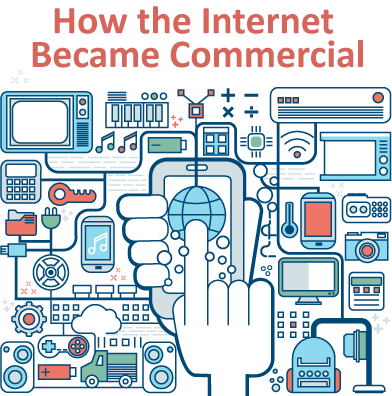How the Internet Became Commercial

What’s Behind the Commercial movement of the Internet? Believe it or not the Internet was not originally created to share your life on social media sites like Facebook and Instagram or to watch movies, play games or follow your favorite pastime. When it was first invented, the military and research universities were the primary users of the Internet, via several loosely connected networks. However, over time, and at a rather rapid pace, the Internet has become the commercial powerhouse it is today. That wasn’t always the plan or the goal for the Internet, so how did it become the mainstream commercialization machine that it is today?
Patterns in the Deployment of Technology
I spoke with Shane Greenstein, who is a faculty member at the Harvard School of Business, about this topic, which also happens to be the subject of his book How the Internet Became Commercial. Shane is the MBA Class of 1957 Professor of Business Administration and co-chair of the HBS Digital Initiative. He teaches in the Technology, Operations and Management Unit. Shane is also co-director of the program on the economics of digitization at The National Bureau of Economic Research. When I spoke with Shane, I noted that now that we’re moving into the realm of big data, understanding human behavior aspect of it. So I asked: “When we look at this today are there patterns that are emerging?
Repetition and Coordination
“The interesting thing is that an awful lot of what we observe today are patterns that we have seen in the past. And the more you appreciate how much repetition there is the easier it is to identify. For example, when very big things deploy you tend to find patterns of hesitance because multiple firms have to cooperate together in order to make something work as a system. Getting that coordination to work is usually quite difficult. That’s something you saw in electricity and automobiles, airplanes the Internet and we are seeing today in big data. Disagreements about fields, disagreements about getting the coordination of different ways and algorithms to get them to work with each and have standardized ways of doing machine learning so that everybody can talk to each other.”
Adaptation Problems
Shane also noted, “The other thing you typically see when big things deploy is adaptation problems. It turns out big technology isn’t useful out of the box. It requires much more investment to adapt to the needs of a particular user and that kind of adaptation is fairly expensive typically. It’s typically where most of society spends most of its money as it turns out. Again you saw it in electricity, you saw the pattern in automobiles and you see it in every major deployment. And again you saw it in the Internet and if you look at big data what’s the big problem? You see it everywhere: adaptation. Lots of firms have the data but they haven’t figured out exactly how to modify it in order to find the value in it.”
To view the full interview with Shane please click here.
How Does Lowering Business Taxes Pay Dividends?
How Does Lowering Business Taxes Pay Dividends? Although most businesses and individuals find their tax bill to be too high, there are some that find the never-ending changes to tax laws and rules even more frustrating. Sometimes it feels that tax laws can be so complicated that all you can do is throw your hands…
Top 10 States with the Best Household Income
What are the top 10 states with the best household income? 10th California – $61,400 Although California has the highest income tax rate at 13.3% they are still ranked as number 10 on our list. California houses the US’s largest tech and entertainment industries it is also home to some of the world’s wealthiest individuals.…
Top 10 Most Expensive Pieces of Art Sold in 2016
What makes a piece of art truly great? For some it’s the artist and for others it’s the piece itself. Still, for others it’s a combination of the two. It is difficult to put a finger on what makes something truly artistic, as well as determining a piece of art’s true value. After all,…
Luxury Vehicles at Bargain Prices
Luxury Vehicles at Bargain Prices The luxury car market is booming, as evidenced by a recent report from consulting firm Bain & Company, which indicated that sales in the luxury car market are expected to grow by 8 percent this year. That means high net worth individuals are busy snapping up some of the hottest…




